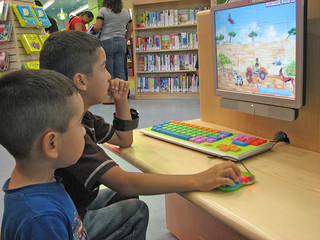According to a new study, we really don’t have to worry too much about the nearly 1 in 4 children without access to FarmVille at home.
“Our results indicate that computer ownership alone is unlikely to have much of an impact on short-term schooling outcomes for low-income children,” report Robert W. Fairlie and Jonathan Robinson in a new study of a large-scale randomized computer give-away experiment in California. On the one hand, it’s good news that doomsday predictions for computer-less children have been exaggerated. However, giving out computers was one of the easier solutions to closing the poverty educational outcome gap, and now we have to go back to the drawing board.
“We find that even though the experiment had a large effect on computer ownership and
total hours of computer use, there is no evidence of an effect on a host of educational outcomes, including grades, standardized test scores, credits earned, attendance, and disciplinary actions,” explains the new report, contradicting previous evidence that children without Internet had a severe disadvantage on exams.
Based on the (reasonable) fear that lack of computer access was hurting poor students, California gave out computers to 1,123 students in grades 6-10 attending 15 schools across the diverse central California area. Most importantly, the data-savvy administrators randomly selected half the students as participants, so that we wouldn’t have to worry about whether those who took up the offer were unusually motivated.
True to their worries, 49 percent of the children didn’t even know how to download a file from the Internet. Naturally, computer use went up, but so did their access to less-than-educational games. “We find that home computers increase total use of computers for schoolwork, but also increase total use of computers for games, social networking and other entertainment, which might offset each other,” surmise the researchers.
Of course, having computers may have non-educational benefits. Basic computer literacy certainly helps in a knowledge economy. But the real problem is that many poor kids never even get a shot at information technology jobs, and the rich-poor gap is only getting worse. The SAT gap has grown 40 percent and college completion has skyrocketed 50 percent since the 1980s.
This means that the likely culprit is far more insidious: the family and environment. I taught at-risk youth for years and saw first-hand how parents who didn’t prioritize college paralyzed their eager children. In my home, it was expected that I go to graduate school before I even knew what it was.
Children without the same expectations have a severe disadvantage, and no gadget is going to fix it.
[H/T: @markwarschauer]
